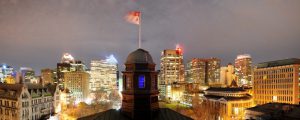
Symposium on free expression and peaceful assembly planned for May 2
By Jim Hynes
The fourth and final Open Forum on Free Expression and Peaceful Assembly brought some 35 members of the McGill community, including Principal Heather Munroe-Blum and Provost Anthony Masi, to the Bellini Atrium of the Life Sciences Complex on April 4, to take part in the continued discussion about what is tolerable or appropriate when it comes the expression of dissent or opinion on campus.
About a dozen students joined McGill faculty and staff members at the event.
Like the three that preceded it, last week’s session featured a wide-ranging discussion that touched on subjects relating to the events of the sometimes tumultuous past year at the University. Among other issues, participants debated the meaning of the word “peaceful” in the context of demonstrations; recent MRO messages about possible demonstrations on campus; the provisional protocol regarding demonstrations, protests and occupations on McGill campuses; the behaviour and presence of security officers on campus; the new reception desk and security protocols in the James Administration building; and student apathy on important University matters.
Student Eli Freedman (U2 Philosophy) criticized the McGill Administration’s response to recent events on campus and the Open Forum initiative itself, saying the sessions were “merely a place for conversation” and not “a decision-making body.”
“I think the more appropriate question is to ask how the Administration can actually collaborate and work with students on these issues of mutual concern as opposed to creating divisions and polarizing debate on campus,” he said. “I believe that the MRO emails have often presented the University’s side of the story…the MROs have really presented the opinions of many senior administrators as representing the entire McGill community, which I believe has created stronger divisions.
“Given the context in which the Administration has filed an injunction against MUNACA, and has really presented protesters in a way that makes these acts of civil disobedience appear threatening or something that would warrant calling in the police, which I believe is seriously misleading, I think that these root causes are really where we should focus, with the spirit of collaboration as opposed to consultation,” continued Freedman.
Sarah Stroud, an Associate Professor in the Philosophy department, spoke in favour of having a protocol on demonstrations, if only to avoid misunderstandings over what would and would not be tolerated, but asked that the University share information on similar regulations existing in other schools. She also expressed concern about the language used in the protocol not being precise enough.
“There’s a real danger in giving the impression that no forms of assembly and dissent will be tolerated because that has a chilling effect on free speech,” she said. “I find it very worrisome if the University’s language about what won’t be tolerated is so loose as to give the impression that just about anything is not going to be tolerated.
“I would have been happier if the provisional protocol, and if there was ever a final version of it, that it uses much tighter language…”
All four Open Forum sessions were chaired by Dean of Arts Christopher Manfredi at the request of the Principal in response to a recommendation in Law Dean Daniel Jutras’s report into the protest and occupation of the James Administration building and the presence on campus of riot police last Nov. 10. Manfredi is also charged with formulating a report based on what he’s heard at the four public sessions and from individuals and groups he has met with separately. He expects to deliver it by early October.
Manfredi’s mandate also includes the organizing of the half-day academic Symposium on Free Expression and Peaceful Assembly, open to all members of the University community. Confirmed participants for the event, which will take place Wednesday, May 2 at the Faculty Club (from 1-4:45 p.m.) include McGill professors Gabriella Coleman, Catherine Lu, and Antonia Maioni, Osgoode Hall Law School (York University) professor Bruce Ryder, and University of East Anglia (UK) professor David Mead, an expert in the area of peaceful protest and public order and the author of the 2010 book New Law of Peaceful Protest: Rights and Regulation in the Human Rights Act Era.
You can learn more about that event, as well as view podcasts and read the minutes of all four of the open forum sessions, at http://blogs.mcgill.ca/openforum-expression/.
